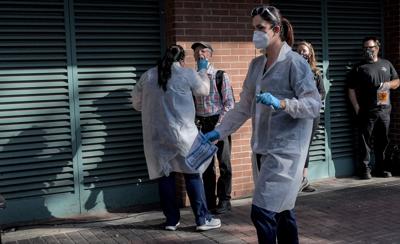The Centers for Disease Control and Prevention will give Louisiana $45.7 million to bolster public health infrastructure over the next five years, the agency recently said. The funding is part of a $3.2 billion grant intended to shore up the public health workforce and modernize data collection.
About $43.7 million of Louisiana's funds will be used for employee retention, creating new positions and supporting Louisiana's only two local health departments in New Orleans and Plaquemines Parish. Those departments were too small to qualify for funding.
The money will also go toward retaining employees who were hired with COVID-19 funds that are expiring soon, according to a representative from the Louisiana Department of Health.
The nearly $2 million remaining will be used as a slush fund for quality improvement, workforce development, grants management, updating data systems and the LDH website communications support through an improved and more accessible LDH website along with a number of other initiatives.
Under the grant, all jurisdictions in the United States will receive funding.
“State, local, and territorial health departments are the heart of the U.S. public health system, and the COVID-19 pandemic severely stressed these agencies, which were already weakened by neglect and underinvestment,” said CDC Director Dr. Rochelle Walensky. “This grant gives these agencies critical funding and flexibility to build and reinforce the nation’s public health workforce and infrastructure, and protect the populations they serve.”
Louisiana has particular public health challenges the grant could help address, said Susan Hassig, epidemiologist at Tulane University. There is “a lot of anti-science” sentiment that increased during the pandemic. Tailoring communication on a number of issues to specific regions could improve public health, along with better data to distribute in those efforts.
“Some additional data people but also some new, more innovative communications people are probably going to be needed to try and work on shifting the tone and the mood of the population of Louisiana with regard to believing public health personnel,” said Hassig. “The pandemic did a real number in that regard.”
The data points and marketing that might work in New Orleans may not work in Lafayette, Hassig pointed out.
But even $45 million will be gobbled up quickly in a state with as many needs as Louisiana, especially if it’s not a renewed grant after the five years. Vector-borne illnesses from animals such as mosquitoes, addiction and gun violence are all epidemic-sized problems in the state, along with the many chronic diseases that are much more prominent in Louisiana than most other states.
“I can just see the tussling over these funds is going to be quite intense,” said Hassig. “Everybody needs help.”
Earlier this year, the state laid out a business plan with goals to address vulnerable populations and improve the health of residents that included plans for child and maternal health, chronic disease, behavioral health and dental health for people with disabilities. The money will help with those goals, said Takeda Ferguson, epidemiologist at LSU Health in New Orleans.
“I think that it can make an impact for us,” said Ferguson. “This can go to plug up some of those areas which they were already thinking about.”


